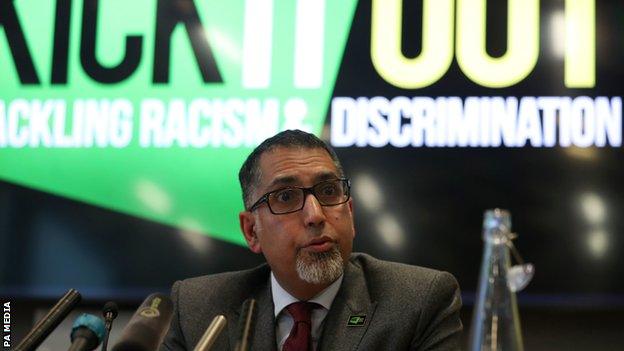Kick It Out welcomes FA efforts on diversity but calls for targets
- Published

Sanjay Bhandari became chairman of anti-racism charity Kick It Out in November 2019
Anti-racism charity Kick it Out has welcomed Football Association chairman Greg Clarke's attempts to diversify the FA board but says real change can only come from setting targets.
Clarke said on Tuesday he was "disappointed" that Premier League and EFL representatives on the board had blocked his proposal, before issuing a statement later suggesting "all parties" did support a review.
The Premier League and EFL said his initial claims did not "reflect the true nature of discussions" and that they supported a review in due course.
Kick It Out chairman Sanjay Bhandari says change needs to "start at the top".
"I welcome the fact that the FA are doing that review or wanting to do that review," he told BBC Sport.
"Every organisation should be thinking about its leadership and its board, and the FA and other football organisations should be no different."
He added: "The giant leap forward is making people accountable for targets and creating targets for coaches and senior leadership - that's how you drive inclusion."
The lack of diversity in football has come under increased scrutiny since professional players decided to take a knee before matches to highlight the Black Lives Matter campaign - a move which the Premier League supported.
Only five of the 91 Premier League and EFL managers or head coaches are from black, Asian or minority ethnic (BAME) backgrounds.
The FA board is made up of 10 people, including Clarke, with only one BAME member - lawyer Rupinder Bains.
One of the options discussed at last week's FA board meeting was making Paul Elliott - chairman of the Inclusion Advisory Board - a director.
Bhandari, who became Kick It Out's chairman in November, supported Elliott's potential inclusion on the board and said football had shown a "willingness to change" since the Black Lives Matter movement had become more prominent.
But he said football organisations should be more co-ordinated in their initiatives.
The English Football League has a version of the Rooney rule, which makes a provision that BAME candidates be interviewed for coaching positions, and the Premier League, FA and Professional Footballers' Association have set up a coach bursary scheme - but positions are only with EFL clubs.
"Part of the typical response of many organisations, and not just in football, to any major external event is to come up with one initiative and put all the hopes in that," Bhandari said.
"What I'm really after is more whole-system thinking and lots of initiatives, but that are connected.
"That's the bit that's missing at the minute. I'm not sure we have enough of the targets and I don't think the initiatives are connected in any meaningful way."
He added: "I can understand why some of the schemes might start coming through the EFL because that's a traditional pathway for some things like coaching.
"But that's all they are - a helpful start. Having interview quotas or bursary schemes that apply to a relatively limited number of people is not really going to move the dial.
"It does feel to me like there is a willingness to change. What we need is to turn that into meaningful action."